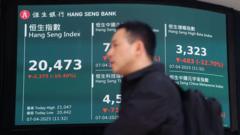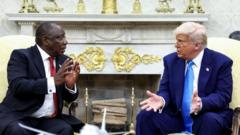The recent tariff announcements by the U.S. have triggered an unprecedented decline in Asian stock markets, raising fears of a potential global recession. Analysts warn that the region's export-driven economies may face severe repercussions, leading to a tumultuous economic landscape.**
Asian Markets Suffer Severe Setbacks Amid Heightened Tariff Tensions**

Asian Markets Suffer Severe Setbacks Amid Heightened Tariff Tensions**
Major Asian stock exchanges plunge as global trade concerns escalate following new U.S. tariffs.**
Asian stock markets are experiencing a dramatic decline, responding to the latest tariffs imposed by U.S. President Donald Trump, which have sent shockwaves through the global economy. Major indexes across the region, from Shanghai to Tokyo, opened significantly lower on Monday, with one analyst labeling the situation a "bloodbath."
As many Asian nations are heavily reliant on manufacturing and exports to the U.S., the implications of these tariffs are profound. By midday, Japan's Nikkei 225 index had fallen by 6%, with Australia’s ASX 200 down by 4% and South Korea's Kospi dropping 4.7%. Further slumps were seen in mainland China, Hong Kong, and Taiwan markets, where investors finally reacted to declines seen in other markets prior due to public holidays.
Julia Lee, Head at FTSE Russell, expressed concerns that rising tariffs are fuelling inflation and recession fears. Goldman Sachs has since raised its estimation of a recession's likelihood in the U.S. within the next year to 45%, while JPMorgan has gone further, predicting a 60% chance of a recession that could have severe global ramifications, particularly for Asian exports.
The intervention by the U.S. has made it clear that Asian economies such as Vietnam and Bangladesh, which have become increasingly dependent on U.S. export markets – Vietnam facing a 46% tariff and Bangladesh a 37% tariff – will undoubtedly bear the brunt of these growing tensions. Major American brands like Nike and Lululemon hold significant production operations in Vietnam, raising concerns for their future operations.
Former U.S. Undersecretary for International Trade Frank Lavin noted that Asia's vulnerability stems from its heavy reliance on the U.S. for export trade compared to other markets. In addition to the domestic impacts, global stock markets continued to face turmoil, exacerbated by China's retaliatory measures against U.S. tariffs, resulting in significant declines in American stock indexes and impacting European markets severely.
As analysts predict a continuing downward trend, stakeholders in Asian economies brace themselves for prolonged challenges, aware that the effects of U.S. policies can reverberate through their markets for the foreseeable future.






















